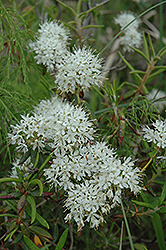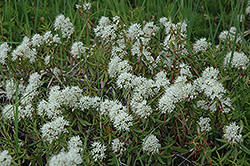Height: 3 feet
Spread: 3 feet
Sunlight:
![]()
![]()
Hardiness Zone: 2a
Other Names: Ledum groenlandicum
Description:
Recently re-classed as a Rhododendron; native in northern climes with lacey white flowers in late spring and a compact habit, quite hardy; a bog plant for use in wet poorly drained areas; must have acidid soil, use plenty of peat moss when planting
Ornamental Features
Labrador Tea features dainty clusters of white star-shaped flowers at the ends of the branches in late spring. It has green foliage with coppery-bronze undersides. The fuzzy narrow leaves remain green throughout the winter.
Landscape Attributes
Labrador Tea is an open multi-stemmed evergreen shrub with a more or less rounded form. Its relatively coarse texture can be used to stand it apart from other landscape plants with finer foliage.
This is a relatively low maintenance shrub, and should only be pruned after flowering to avoid removing any of the current season's flowers. It has no significant negative characteristics.
Labrador Tea is recommended for the following landscape applications;
- Mass Planting
- General Garden Use
- Naturalizing And Woodland Gardens
- Bog Gardens
Planting & Growing
Labrador Tea will grow to be about 3 feet tall at maturity, with a spread of 3 feet. It has a low canopy. It grows at a slow rate, and under ideal conditions can be expected to live for 40 years or more.
This shrub does best in full sun to partial shade. You may want to keep it away from hot, dry locations that receive direct afternoon sun or which get reflected sunlight, such as against the south side of a white wall. It prefers to grow in moist to wet soil, and will even tolerate some standing water. It is particular about its soil conditions, with a strong preference for poor, acidic soils. It is somewhat tolerant of urban pollution. This species is native to parts of North America.


